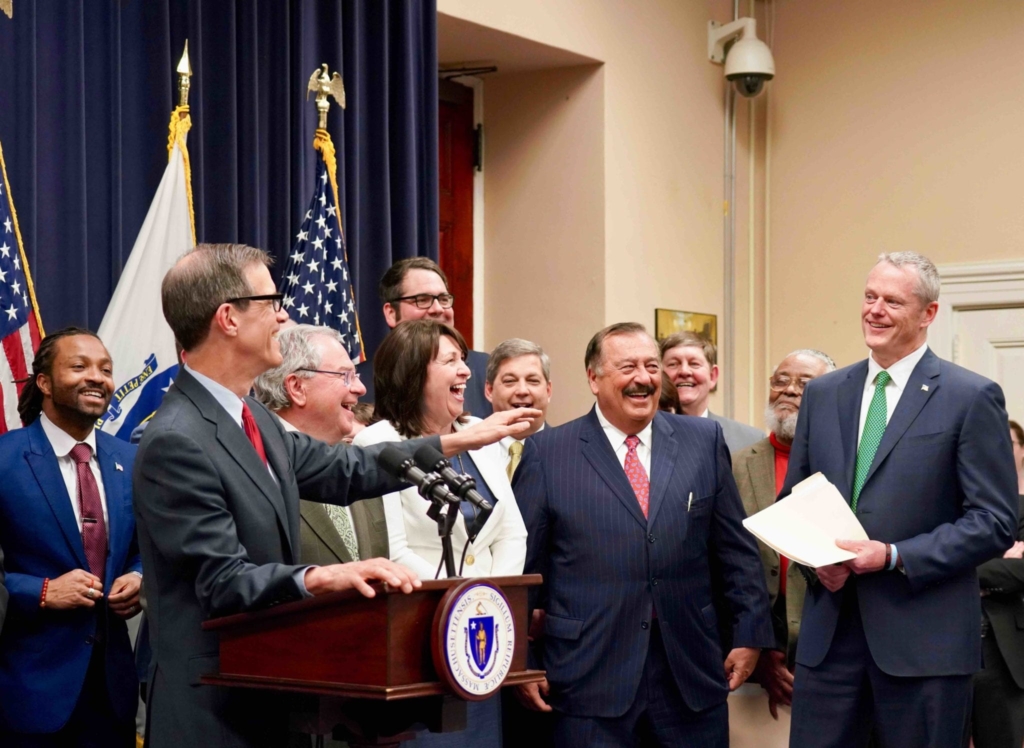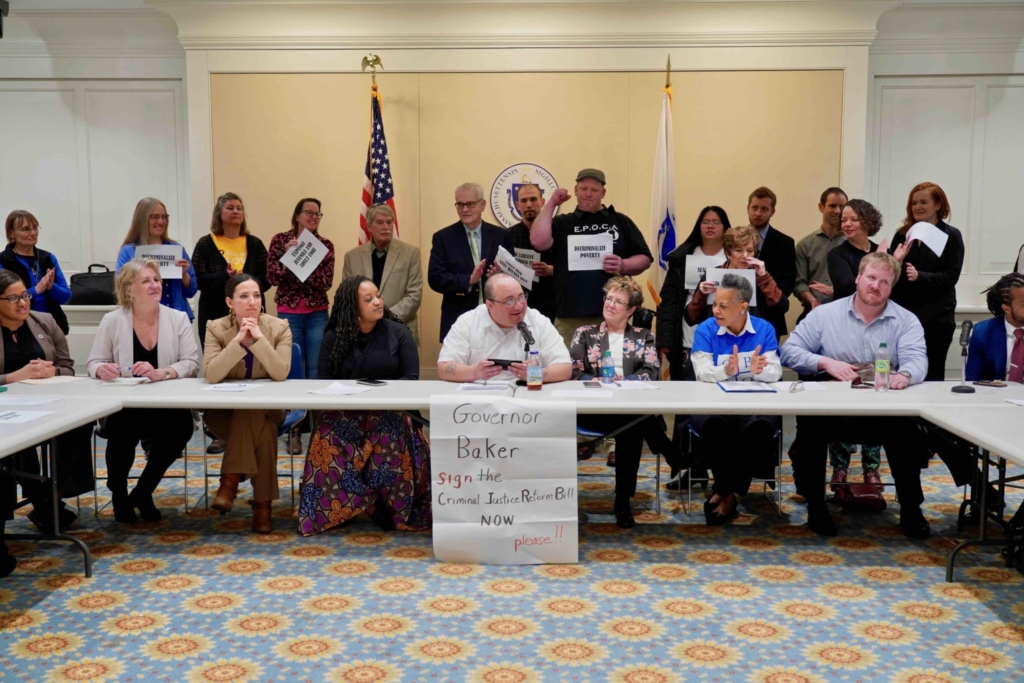Criminal justice bill reaches finish line
Baker signs comprehensive legislation, while signaling concern with parts of it

Gov. Charlie Baker signs criminal justice legislation at the State House on Friday.
GOV. CHARLIE BAKER signed sweeping criminal justice legislation on Friday, capping several years of discussion on Beacon Hill and casting Massachusetts squarely in the national wave of rethinking tough-on-crime laws of the 1980s and 90s.
Flanked at the State House by more than a dozen lawmakers from both parties, Baker said, “Viewed as a whole, this bill takes our criminal justice system and makes it better.” At the same time, he said there are parts of the measure he is troubled by and announced that he is filing new legislation to address those.
The bill touches on nearly every part of the criminal justice system, with an aim of reducing number of people entering it or getting unnecessarily caught in its web. It eliminates several mandatory minimum sentences for drug offenses, and raises the age at which children can be charged in juvenile court from 7 to 12. It creates reforms targeted at preventing defendants who have not yet been tried from being held solely because they can’t afford bail. It will allow criminal records to be expunged for some offenses committed when an individual was younger than 21.
The bill also includes new reforms aimed at reducing solitary confinements stays in prisons creates new diversion programs to steer low-level offenders away from criminal penalties. It raises the threshold for felony larceny, which has not been adjusted in decades. Currently, theft of goods worth at least $250 qualifies as a felony. Under the new law, that will increase to $1,200.
The bill’s provisions are not aimed entirely at relieving the impact of the criminal justice system on offenders. It includes a new mandatory minimum sentence for trafficking the deadly opioids fentanyl and carfentanil. It also includes new sanctions for repeat drunken drivers, and imposes a new mandatory minimum sentence for assault and battery on a police officer.
There was lots of bipartisan bonhomie at Friday’s ceremony. But one might be forgiven at points for wondering whether officials were talking about the same bill.
While Democrats highlighted the many provisions of the bill geared toward lightening the heavy hand that the criminal justice system has applied to offenders, Baker seemed the reluctant reformer when it came to those changes, focusing instead on the penalties for fentanyl and carfentanil trafficking and other new sanctions in the bill.
“This bill is about lifting people up instead of locking people up,” said Sen. Will Brownsberger, cochairman of the Joint Committee on the Judiciary and a lead sponsor of the legislation. “It’s about cutting the chains that hold people down from trying to get back on their feet, and it’s about protecting public safety.”
Rep. Claire Cronin, the House cochair of the Judiciary Committee, pointed out that the House and Senate passed the bill last week on the 50th anniversary of the assassination of Martin Luther King, Jr. “On that day 50 years ago, hopes were crushed, dreams were shattered,” she said. “And I am proud to say that today, 50 years later, those same hopes and dreams are being realized in the State House as we sign this very momentous piece of legislation.”
That tone of uplift was largely missing in the comments from Baker, who focused on the new fentanyl penalties and the “many other public safety priorities we filed” that are included in the bill.

Sen. Will Brownsberger thanks Gov. Charlie Baker for supporting the bill.
The contrasting messages reflect the political crosscurrents that have been at play throughout the criminal justice reform conversation, which was kicked off nearly three years ago when state leaders invited policy experts from the nonpartisan Council of State Governments to lead an examination of Massachusetts policies.
Sharp differences were present from the start among the four leaders who launched the policy review – Baker, House Speaker Robert DeLeo, then-Senate President Stan Rosenberg, and Supreme Judicial Court Chief Justice Ralph Gants.
Rosenberg and Gants long favored a more sweeping review of criminal justice policy that includes sentencing reforms. Gants has been outspoken in criticizing what he says are racial disparities in system.
DeLeo was more circumspect in articulating where he stood, but Baker never seemed enthused about a wide-ranging reform package, and repeatedly emphasized the state’s very low incarceration rate compared with other states. Massachusetts has the second lowest incarceration rate in the country.
The one area the four leaders could agree to examine was reentry services in prison and other measures aimed at smoothing inmates’ transition out of jail and reducing recidivism rates.
In February 2017, the four leaders unveiled a bill resulting from the policy review. It focused on establishing new ways for inmates to earn “good time” credits to shave time over their sentence, and setting up more programming for them while incarcerated.
The goal, said leaders, was to reduce high recidivism rates, something that bedevils criminal justice systems throughout the country. In Massachusetts in 2011, nearly half of those exiting county jails faced a new conviction within three years, while nearly 40 percent of those leaving state prisons wound up incarcerated again within that span.
While pointing to the ongoing problem with recidivism, Baker said at the roll out of that bill, “By and large, people who aren’t supposed to be in the Massachusetts prison system typically are not.”
Democratic lawmakers and reform advocates disagreed, saying the state’s low incarceration rate compared with other states only made us “the best of the worst.” They pointed out that US incarceration rates are far higher than those of other developed countries, and Brownsberger often cited the fact that Massachusetts was locking up people at four times the rate of incarceration of 40 years ago.
Advocates pressed hard for lawmakers to take up broader reforms beyond those in the recidivism-focused bill, which Baker also signed at Friday’s event. But it was not always clear that their efforts would bear fruit.
In December 2016, activists interrupted the final meeting of a working group examining recidivism and other issues at the “back end” of the criminal justice system when offenders are preparing to leave prison. “They’re focusing so much on the back end. They’re not talking about the fact that people are going to jail in such large numbers,” Calvin Feliciano, a protester with the Jobs not Jails coalition, said at the meeting.
Around the same time, the state’s four Roman Catholic bishops and the Legislature’s Black and Latino Legislative Caucus sent letters to state leaders urging broader reforms that also focus on sentencing policy.
Activists met with DeLeo, who signaled a willingness to consider a more far-reaching bill, and the process leading to the more comprehensive bill was set in motion.
On Friday morning, a handful of lawmakers joined several dozen activists from community groups that pushed for more comprehensive reform at a State House press conference where they had planned to issue a call for Baker to the sign the bill. With word filtering out that he would do just that later in the day, the session turned into more of a victory celebration.

Advocates who gathered at the State House on Friday morning to urge Baker to sign the criminal justice bill learned that he would do so later that afternoon.
Sen. Sonia Chang-Diaz told the activists they were the reason the why the state embraced wider reforms. The bill “happened because of you,” she said of their organizing and lobbying efforts.
“I have witnessed an incredible paradigm shift that has happened in the public mind in Massachusetts over a few years and in particular over the last year,” Chang-Diaz said of support for criminal justice reform.
A recent survey by the MassINC Polling Group supports that claim, showing strong support for the legislation signed on Friday.
“This is a landmark law, as it should be coming out of Massachusetts,” said Attorney General Maura Healey at Friday’s bill signing. “We’ve led on much over the years.”
In fact, Massachusetts has been more laggard than leader in rethinking criminal justice policies in recent years. Many conservative states — driven by both a concern over jailing too many people and the cost to budgets that was exacting — have taken steps to enact reforms and reduce incarceration rates during the time Massachusetts has hesitated.
Some of that may be because we have not gone as far down the incarceration road as other states. But it also may be part of a particular Massachusetts skittishness about looking soft on crime.
We were known for years as state that brought the country Willie Horton, the furloughed murderer who helped sink Michael Dukakis’s 1988 presidential campaign. There has been an uneasiness ever since about dialing back criminal sanctions. In his 1990 campaign for governor, Bill Weld famously vowed to reintroduce prisoners to “the joys of busting rocks.”
But Weld said in an interview two years ago that some of his thinking on those issues has changed, and it has apparently changed enough, too, among current state leaders, including his one-time protege.
Asked after signing the bill, which removes several mandatory minimum sentences for drug offenses, whether his view on those sentences has changed, Baker didn’t answer directly. “We still have what I would argue is a pretty solid set of tools in the toolbox for our colleagues in law enforcement,” he said. “In the grand scheme of things, the very positive elements of this bill far outweigh some of the concerns we have.”
Along with signing the two criminal justice bills, Baker filed new legislation Friday that introduces some new criminal justice measures and addresses some things he would like changed in the new omnibus law. Among the things called for in his bill are protections to ensure that law enforcement and education officials can maintain access to sealed records, something Baker said was crucial for firearms licensing and clearing individuals to work with children.





